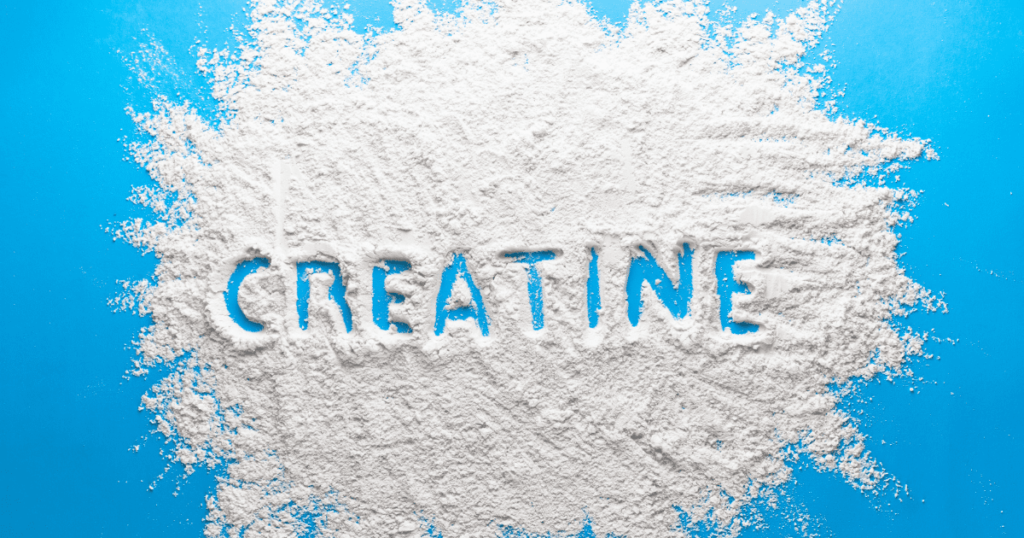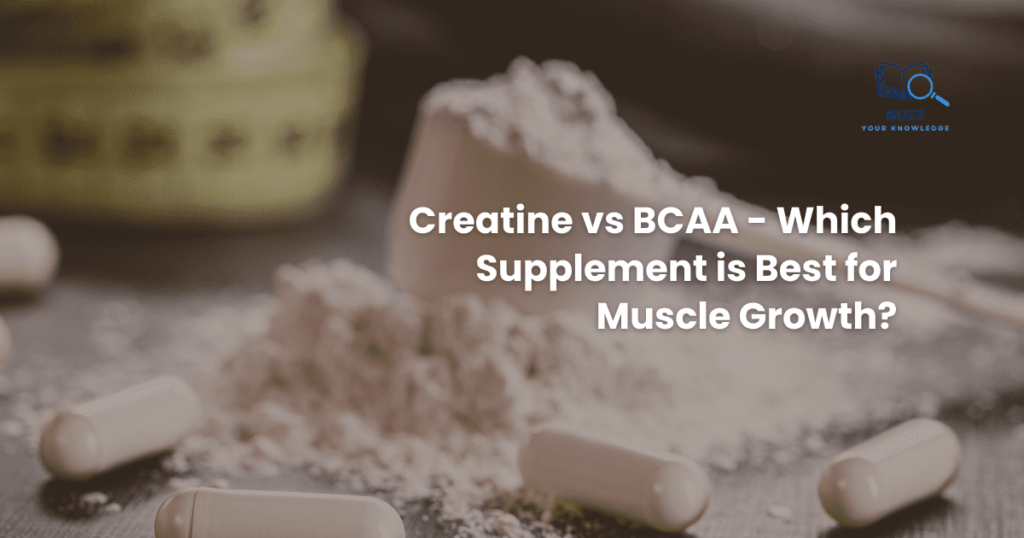Discover the differences between creatine vs BCAA and find out which supplement is best for your fitness goals. Learn about their benefits, mechanisms, and practical tips for integration. Join the discussion, share your experiences, and follow us for more fitness insights!
In the world of fitness and bodybuilding, supplements can make a significant difference in achieving your muscle growth goals. Choosing the right supplement can enhance your performance, boost your recovery, and maximize your gains. But how can you choose when there are so many possibilities available?
In this blog, we will delve into the comparison between two popular supplements—creatine vs bcca. By examining their benefits, mechanisms of action, and effectiveness, we aim to help you determine which supplement is best suited for your muscle growth needs.
Understanding the Basics
What is Creatine?

Small levels of the naturally occurring substance creatine can be found in several meals, including fish and red meat. It is also synthesized in the body from amino acids, primarily in the liver, kidneys, and pancreas.
How Creatine Works in the Body to Support Muscle Growth
Creatine is stored in the muscles as creatine phosphate and plays a crucial role in the production of adenosine triphosphate (ATP), the primary energy currency of the cell. During high-intensity exercise, ATP is rapidly depleted, and creatine phosphate helps to quickly regenerate ATP, allowing for sustained muscle contraction and improved performance. This increased availability of energy helps enhance strength, power, and muscle growth.
What are BCAAs?
Definition and Natural Sources of BCAAs (Leucine, Isoleucine, Valine)

Leucine, isoleucine, and valine are the three necessary amino acids that make up branched-chain amino acids, or BCAAs. These amino acids are termed “branched-chain” due to their unique chemical structure. BCAAs are found in high-protein foods such as meat, dairy products, and legumes.
How BCAAs Function in the Body to Promote Muscle Protein Synthesis
BCAAs are metabolized directly in the muscles rather than the liver, making them readily available during exercise. Leucine, in particular, plays a critical role in stimulating the mammalian target of rapamycin (mTOR) pathway, which is essential for initiating muscle protein synthesis. This process helps build and repair muscle tissues, making BCAAs valuable for muscle growth and recovery. Additionally, BCAAs can help reduce muscle breakdown during exercise, preserving lean muscle mass.
Benefits of Creatine for Muscle Growth
Increased Strength and Power
How Creatine Enhances ATP Production
Creatine enhances the production of adenosine triphosphate (ATP), the primary energy molecule used during high-intensity, short-duration exercises like weightlifting and sprinting. When ATP is used up during muscle contraction, creatine phosphate donates a phosphate group to ADP (adenosine diphosphate) to quickly regenerate ATP, allowing for prolonged and more intense muscle activity.
Effects on Strength and High-Intensity Performance
By boosting ATP availability, creatine allows athletes to exert greater force and sustain high-intensity efforts for longer periods. This leads to significant improvements in strength, power output, and overall athletic performance, enabling users to lift heavier weights and perform more reps, which contributes to muscle growth.
Enhanced Muscle Volume
Creatine’s Role in Drawing Water into Muscle Cells
Creatine has a volumizing effect on muscle cells by drawing water into them. This intracellular water retention increases muscle cell hydration, making muscles appear fuller and more pronounced.
Benefits of Increased Muscle Cell Volume for Growth
The increased volume and hydration within muscle cells can create an anabolic environment that promotes protein synthesis and muscle growth. Hydrated cells are also more efficient in nutrient uptake, which aids in recovery and growth.
Improved Recovery
How Creatine Aids in Faster Recovery Between Sets and Workouts
By enhancing ATP regeneration, creatine helps reduce the time needed for muscles to recover between sets and during workouts. This allows for shorter rest periods and more effective training sessions.
Reduction of Muscle Damage and Soreness
Creatine has been shown to reduce markers of muscle damage and inflammation following intense exercise. This can lead to less muscle soreness (delayed onset muscle soreness or DOMS) and quicker recovery times, allowing for more frequent and intense training sessions, further promoting muscle growth.
Benefits of BCAAs for Muscle Growth

Stimulation of Muscle Protein Synthesis
Role of Leucine in Triggering the mTOR Pathway
Leucine, one of the three BCAAs, plays a crucial role in activating the mammalian target of rapamycin (mTOR) pathway. This pathway is a key regulator of cell growth and protein synthesis in the muscles, acting as a signal for the body to build and repair muscle tissues.
Overall Impact on Muscle Building
By stimulating the mTOR pathway, leucine effectively promotes muscle protein synthesis, which is essential for muscle growth and repair. This process helps increase muscle mass and strength, especially when combined with resistance training.
Reduced Muscle Breakdown
How BCAAs Help Preserve Muscle Mass During Exercise
During intense exercise, the body can enter a catabolic state, breaking down muscle proteins for energy. BCAAs help to counteract this by providing an alternative energy source and preserving muscle tissue.
Benefits During Calorie Restriction or Intense Training Periods
For individuals on calorie-restricted diets or undergoing intense training, BCAAs can be particularly beneficial. They help maintain muscle mass by reducing protein breakdown, which is crucial for preserving lean muscle while losing fat or during periods of heavy training stress.
Decreased Muscle Soreness
Impact of BCAAs on Reducing DOMS (Delayed Onset Muscle Soreness)
BCAAs have been shown to reduce the severity of delayed onset muscle soreness (DOMS) following strenuous exercise. This reduction in soreness allows athletes to recover more quickly and return to their training routine sooner.
Enhanced Recovery Post-Exercise
By reducing muscle soreness and damage, BCAAs contribute to faster recovery times. This enhanced recovery means that muscles can repair and grow more efficiently, enabling more consistent and effective training sessions.
The benefits of BCAAs in stimulating muscle protein synthesis, reducing muscle breakdown, and decreasing muscle soreness make them a valuable supplement for those looking to enhance muscle growth and recovery, especially during challenging training periods or calorie restriction.
Comparing Creatine vs BCAA
Mechanisms of Action
Creatine
Creatine supports muscle growth by increasing the availability of ATP, the primary energy currency of cells. This leads to enhanced strength, power, and performance during high-intensity, short-duration exercises. Creatine also promotes muscle cell hydration and volume, creating an environment conducive to muscle protein synthesis and growth.
BCAA
BCAAs, particularly leucine, stimulate the mTOR pathway, which is crucial for initiating muscle protein synthesis. They help reduce muscle protein breakdown during exercise and support quicker recovery by reducing muscle soreness and damage. BCAAs provide an immediate energy source during prolonged exercise, helping to preserve muscle mass.
Suggested Read: EAA vs BCAA: Which Supplement is Right for You?
Effectiveness for Different Training Goals
Strength Training
Creatine is more suitable for strength training and high-intensity, short-duration exercises. Its ability to regenerate ATP quickly allows for more powerful and sustained muscle contractions, leading to greater strength and muscle gains. Creatine is ideal for weightlifters, powerlifters, and athletes engaging in explosive sports.
Endurance Training
BCAAs are more beneficial for endurance training and prolonged, moderate-intensity activities. They help preserve muscle mass by reducing protein breakdown and provide an energy source during extended exercise sessions. BCAAs are ideal for endurance athletes, long-distance runners, and those involved in sustained aerobic activities.
Synergistic Effects
Combining Creatine vs BCAA
Using creatine vs BCAA together can offer complementary benefits. Creatine enhances strength, power, and muscle volume, while BCAAs support muscle protein synthesis, reduce muscle breakdown, and aid in recovery. The combination can lead to improved performance, greater muscle gains, and faster recovery, making it an effective strategy for athletes and fitness enthusiasts looking to maximize their results.
By understanding the distinct mechanisms and benefits of creatine vs BCAA, as well as their effectiveness for different training goals, individuals can make informed decisions about which supplement to use. Combining both can provide a well-rounded approach to muscle growth, strength, and endurance.
Choose The Right Supplement for You

Assessing Your Fitness Goals
- Strength and Power
If your primary focus is on increasing strength and power, especially for activities like weightlifting or sprinting, creatine may be the better choice. Its ability to rapidly regenerate ATP supports high-intensity, short-duration exercises.
- Muscle Mass
For those aiming to maximize muscle mass, both creatine vs BCAA can be beneficial. Creatine helps by increasing muscle volume and enhancing performance, while BCAAs promote muscle protein synthesis and reduce muscle breakdown.
- Endurance
If endurance is your main goal, such as long-distance running or cycling, BCAAs might be more suitable. They help reduce muscle soreness and fatigue, preserving muscle mass during prolonged exercise.
- Recovery
For faster recovery, both supplements can be useful. Creatine helps reduce muscle damage and soreness, while BCAAs decrease delayed onset muscle soreness (DOMS) and aid in quicker recovery post-exercise.
Personal Factors to Consider
Dietary Habits and Existing Supplementation
Consider your current diet and supplement intake. If you already consume a high-protein diet, you might be getting sufficient BCAAs from food, but creatine might still offer additional benefits. Vegetarians and vegans might benefit more from both supplements due to lower natural intake from plant-based diets.
Health Conditions and Potential Side Effects
Always consult with a healthcare provider before starting any new supplement, especially if you have existing health conditions. Creatine is generally safe but can cause digestive issues in some individuals. BCAAs are also safe but should be used cautiously by those with certain medical conditions or taking specific medications.
Practical Tips for Integration
Recommended Dosages and Timing
- Creatine
- Typical dosage: 3-5 grams per day.
- Timing: Can be taken before or after workouts. Some people prefer a loading phase of 20 grams per day for the first week to saturate muscles quickly, followed by a maintenance dose of 3-5 grams daily.
- BCAAs
- Typical dosage: 5-10 grams per day.
- Timing: Best taken before, during, or after workouts to support muscle synthesis and reduce fatigue.
- Tips for Incorporating Supplements into Your Routine
- Creatine
- Mix with water, juice, or a post-workout shake.
- Stay hydrated, as creatine draws water into muscle cells.
- BCAAs
- Mix with water or a sports drink for easy consumption during workouts.
- Consider flavored BCAAs for better taste and adherence to supplementation.
- Creatine
We’ve explored the benefits and distinctions between creatine vs BCAA. Creatine enhances strength, power, and muscle volume by increasing ATP production and muscle cell hydration. On the other hand, BCAAs, especially leucine, stimulate muscle protein synthesis, reduce muscle breakdown, and aid in recovery, making them ideal for endurance training and muscle preservation.
Now that you’re equipped with knowledge about creatine vs BCAA, it’s time to take action. Evaluate your fitness goals and choose the supplement that aligns best with your objectives. Whether you’re aiming to increase strength, build muscle, improve endurance, or recover faster, there’s a supplement suited to your needs.
Don’t miss out on valuable fitness tips and updates! Follow us on social media for more insights, inspiration, and expert advice to help you reach your fitness goals and live your best life. Stay connected, stay motivated, and keep striving for greatness!









